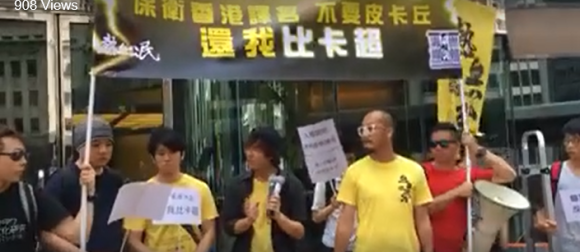
Pikachu and Nintendo find themselves in the middle of a cultural controversy in Hong Kong.
When the Pokémon Company announced last month that it was holding a “general election,” with the entire pantheon of Pocket Monsters as candidates, it seemed like a playfully tongue-in-cheek way to refer to a popularity poll. Now, though, Pokémon is at the center of an actual social/political controversy in Hong Kong.
On Monday, a group of 20 demonstrators gathered in Chater Garden, in Hong Kong’s Central District. After assembling, they walked the 650 meters (0,4 miles) to the gates of the Japanese consulate, all to deliver a letter protesting a recent decision to change the way series mascot and electric-type Pokémon Pikachu’s name is officially rendered in written Chinese.
In Japanese, Pikachu’s name is written in phonetic katakana. However, since Chinese lacks a purely phonetic script, Chinese characters have to be chosen to approximate the pronunciation of the Pocket Monster’s name. The pronunciation of the same written characters differs between Chinese dialects, so until now Pikachu has had his name written differently in Mandarin-speaking mainland China and traditionally Cantonese-speaking Hong Kong.
Pikachu’s Mandarin name is rendered in the Latin alphabet as Pei Ka Yau, whereas his Cantonese moniker would be Bei Ka Chiu (for the record, Romanizations of Chinese words often fail to intuitively convey how they’re actually pronounced to English-speakers). In an effort to standardize the franchise’s marketing in the region, though, Nintendo has announced that in the future Pikachu will be Pei Ka Yau in both Hong Kong and the mainland.
The protestors claim that the Cantonese reading for the characters in Bei Ka Chiu are closer to the original “Pikachu” pronunciation than that for the characters Pei Ka Yau. To show their displeasure, the demonstrators tore up papers bearing the Pei Ka Yau version of the name.
But there’s more behind the joint protest by the members of groups Civic Passion and Lonely Media than video game localization loyalty. Since the return of Hong Kong to the Chinese government in 1997, many residents feel that the city’s linguistic heritage is being trampled on as Cantonese, the primary language of Hong Kong for generations, is slowly being pushed out by Mandarin, in both professional and educational settings. As such, Nintendo’s planned renaming of Pikachu has struck a raw nerve for those who want not only to catch all the Pokémon, but also hang on to the one language they feel best represents the local culture.
Follow Casey on Twitter for more ways Pikachu is changing the world.
Source: Hong Kong Free Press via Anime News Network
Top image: Facebook/毒撚媒體LonelyMedia

 What was this Attack on Titan giant doing at a protest in Hong Kong?
What was this Attack on Titan giant doing at a protest in Hong Kong? McDonald’s breakfast menu in Hong Kong is like nothing we’ve ever seen in Japan
McDonald’s breakfast menu in Hong Kong is like nothing we’ve ever seen in Japan Flaming dump truck seen speeding through undersea tunnel in Hong Kong 【Video】
Flaming dump truck seen speeding through undersea tunnel in Hong Kong 【Video】 Traditional Chinese art mixes with Star Wars characters to celebrate the New Year
Traditional Chinese art mixes with Star Wars characters to celebrate the New Year Celebrating Bruce Lee’s 75th birthday with a Hong Kong pilgrimage
Celebrating Bruce Lee’s 75th birthday with a Hong Kong pilgrimage Foreigner’s request for help in Tokyo makes us sad for the state of society
Foreigner’s request for help in Tokyo makes us sad for the state of society Seaside scenery, history, and so many desserts on Yokohama’s Akai Kutsu【Japan Loop Buses】
Seaside scenery, history, and so many desserts on Yokohama’s Akai Kutsu【Japan Loop Buses】 Japanese city loses residents’ personal data, which was on paper being transported on a windy day
Japanese city loses residents’ personal data, which was on paper being transported on a windy day Randomly running into a great sushi lunch like this is one of the best things about eating in Tokyo
Randomly running into a great sushi lunch like this is one of the best things about eating in Tokyo Harajuku Station’s beautiful old wooden building is set to return, with a new complex around it
Harajuku Station’s beautiful old wooden building is set to return, with a new complex around it Japan’s summertime towelket pillowcases are even better with the addition of Ghibli stars【Photos】
Japan’s summertime towelket pillowcases are even better with the addition of Ghibli stars【Photos】 Japan’s new wearable air conditioner belt is here just in time for the Tokyo heat wave
Japan’s new wearable air conditioner belt is here just in time for the Tokyo heat wave Japanese politician’s birthrate plan: Have parents nag their kids to have “at least three babies”
Japanese politician’s birthrate plan: Have parents nag their kids to have “at least three babies” Japanese woman stumbles on the power of the infamous “gaijin seat” phenomenon during flight
Japanese woman stumbles on the power of the infamous “gaijin seat” phenomenon during flight Japan has only one time zone, and sunset comes a lot earlier in Tokyo【Photos】
Japan has only one time zone, and sunset comes a lot earlier in Tokyo【Photos】 McDonald’s new Happy Meals offer up cute and practical Sanrio lifestyle goods
McDonald’s new Happy Meals offer up cute and practical Sanrio lifestyle goods Japanese ramen restaurants under pressure from new yen banknotes
Japanese ramen restaurants under pressure from new yen banknotes French Fries Bread in Tokyo’s Shibuya becomes a hit on social media
French Fries Bread in Tokyo’s Shibuya becomes a hit on social media Studio Ghibli releases new action figures featuring Nausicaä of the Valley of the Wind characters
Studio Ghibli releases new action figures featuring Nausicaä of the Valley of the Wind characters Red light district sushi restaurant in Tokyo shows us just how wrong we were about it
Red light district sushi restaurant in Tokyo shows us just how wrong we were about it New private rooms on Tokaido Shinkansen change the way we travel from Tokyo to Kyoto
New private rooms on Tokaido Shinkansen change the way we travel from Tokyo to Kyoto Tokyo Tsukiji fish market site to be redeveloped with 50,000-seat stadium, hotel, shopping center
Tokyo Tsukiji fish market site to be redeveloped with 50,000-seat stadium, hotel, shopping center Beautiful Ghibli sealing wax kits let you create accessories and elegant letter decorations【Pics】
Beautiful Ghibli sealing wax kits let you create accessories and elegant letter decorations【Pics】 Studio Ghibli releases Kiki’s Delivery Service chocolate cake pouches in Japan
Studio Ghibli releases Kiki’s Delivery Service chocolate cake pouches in Japan New definition of “Japanese whiskey” goes into effect to prevent fakes from fooling overseas buyers
New definition of “Japanese whiskey” goes into effect to prevent fakes from fooling overseas buyers Our Japanese reporter visits Costco in the U.S., finds super American and very Japanese things
Our Japanese reporter visits Costco in the U.S., finds super American and very Japanese things All-you-can-drink Starbucks and amazing views part of Tokyo’s new 170 meter-high sky lounge
All-you-can-drink Starbucks and amazing views part of Tokyo’s new 170 meter-high sky lounge More foreign tourists than ever before in history visited Japan last month
More foreign tourists than ever before in history visited Japan last month New Pokémon cakes let you eat your way through Pikachu and all the Eevee evolutions
New Pokémon cakes let you eat your way through Pikachu and all the Eevee evolutions Disney princesses get official manga makeovers for Manga Princess Cafe opening in Tokyo
Disney princesses get official manga makeovers for Manga Princess Cafe opening in Tokyo Sales of Japan’s most convenient train ticket/shopping payment cards suspended indefinitely
Sales of Japan’s most convenient train ticket/shopping payment cards suspended indefinitely Sold-out Studio Ghibli desktop humidifiers are back so Totoro can help you through the dry season
Sold-out Studio Ghibli desktop humidifiers are back so Totoro can help you through the dry season Japanese government to make first change to romanization spelling rules since the 1950s
Japanese government to make first change to romanization spelling rules since the 1950s Ghibli founders Toshio Suzuki and Hayao Miyazaki contribute to Japanese whisky Totoro label design
Ghibli founders Toshio Suzuki and Hayao Miyazaki contribute to Japanese whisky Totoro label design Doraemon found buried at sea as scene from 1993 anime becomes real life【Photos】
Doraemon found buried at sea as scene from 1993 anime becomes real life【Photos】 Tokyo’s most famous Starbucks is closed
Tokyo’s most famous Starbucks is closed One Piece characters’ nationalities revealed, but fans have mixed opinions
One Piece characters’ nationalities revealed, but fans have mixed opinions We asked a Uniqlo employee what four things we should buy and their suggestions didn’t disappoint
We asked a Uniqlo employee what four things we should buy and their suggestions didn’t disappoint Princesses, fruits, and blacksmiths: Study reveals the 30 most unusual family names in Japan
Princesses, fruits, and blacksmiths: Study reveals the 30 most unusual family names in Japan Pikachu speaks English in newest Pokémon anime movie, freaks out audiences【Video】
Pikachu speaks English in newest Pokémon anime movie, freaks out audiences【Video】 Life-size Pikachu figure that wirelessly charges electronics fills us with joy/jealousy【Video】
Life-size Pikachu figure that wirelessly charges electronics fills us with joy/jealousy【Video】 Pen-Pikachu-Apple-Pen? Pokémon star teams up with PPAP singer for new song
Pen-Pikachu-Apple-Pen? Pokémon star teams up with PPAP singer for new song Hong Kong protesters apologizing for airport disruption strikes a chord with Japanese netizens
Hong Kong protesters apologizing for airport disruption strikes a chord with Japanese netizens Hong Kong counter-protesters gather to sing Chinese national anthem on streets of Osaka, Japan
Hong Kong counter-protesters gather to sing Chinese national anthem on streets of Osaka, Japan There’s something strange with these Hollywood horrors: they’re adorable and awesome! 【Art】
There’s something strange with these Hollywood horrors: they’re adorable and awesome! 【Art】 In pictures: Everyday life in China and Hong Kong, 1868-1872【Photos】
In pictures: Everyday life in China and Hong Kong, 1868-1872【Photos】 We eat Chinese food inspired by Demae Itcho instant ramen to celebrate its 55-year anniversary
We eat Chinese food inspired by Demae Itcho instant ramen to celebrate its 55-year anniversary New Google Home/Amazon Alexa app lets you have conversations with Pikachu!
New Google Home/Amazon Alexa app lets you have conversations with Pikachu! TV audiences in Japan surprised to see “Pikachu,” “Raichu” as members of U.S. Olympic team
TV audiences in Japan surprised to see “Pikachu,” “Raichu” as members of U.S. Olympic team Newest Pikachu figure is fully posable, fiercely adorable 【Photos】
Newest Pikachu figure is fully posable, fiercely adorable 【Photos】 Chinese politician says kung fu movies show why umbrella protesters must be stopped
Chinese politician says kung fu movies show why umbrella protesters must be stopped Pokémon Center apologizes for writing model Nicole Fujita’s name as Nicole Fujita
Pokémon Center apologizes for writing model Nicole Fujita’s name as Nicole Fujita
Leave a Reply